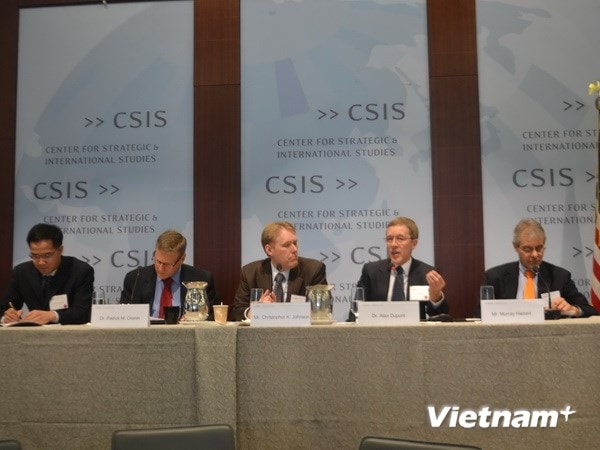International conference on the East Sea in the US made many recommendations.
On the evening of July 10, Vietnam time, the fourth annual conference on the East Sea organized by the Center for Strategic and International Studies (CSIS) opened in Washington, DC, USA, bringing together leading scholars from the US, China, India, Japan, Australia, Malaysia, the Philippines and Vietnam.
On the evening of July 10, Vietnam time, the fourth annual conference on the East Sea organized by the Center for Strategic and International Studies (CSIS) opened in Washington, DC, USA, bringing together leading scholars from the US, China, India, Japan, Australia, Malaysia, the Philippines and Vietnam.
With the theme "Current trends in the East Sea and US policy," scholars deeply analyzed recent developments in the East Sea, especially China's brazen and illegal placement of the Haiyang Shiyou-981 drilling rig in Vietnam's exclusive economic zone (EEZ) and continental shelf, as well as the legal lawsuit that the Philippines is filing against China at the United Nations Tribunal on the Law of the Sea (ITLOS).
 |
| Speakers at the conference. (Photo: Quang Hoa/Vietnam+) |
At the workshop, delegates made many recommendations, especially to the US, on measures to deal with China's increasingly aggressive actions, contributing to easing tensions and maintaining stability in the region.
At this two-day conference, two researchers from Vietnam - Mr. Tran Truong Thuy of the East Sea Research Foundation and Mr. Vu Hai Dang of the Vietnam Lawyers Association, as keynote speakers, especially emphasized China's illegal placement of the Haiyang Shiyou-981 oil rig in Vietnam's EEZ and continental shelf since early May. According to the two speakers, this is "a turning point and a new level of assertiveness for China."
Two scholars recommended that the US and the Association of Southeast Asian Nations (ASEAN) should take the lead in building a Code of Conduct in the East Sea (COC), supporting the use of peaceful measures to resolve disputes, including arbitration through international arbitration mechanisms.
Also at the conference, Congressman Mike Rogers, Chairman of the US House Intelligence Committee, said that the US diplomatic strategy with China on the East Sea issue has been ineffective so far and now is the time to recalculate. According to him, the longer the confrontation in the East Sea lasts, the more likely armed conflict will occur.
The chairman of the House Intelligence Committee stressed that the US must not only strengthen existing alliances and friendships, but also build new relationships in Asia, both in trade and security. He also urged the US government to speak out more directly and forcefully on diplomacy with China.
Scholar Patrick Cronin, Director of the Asia-Pacific Security Program at the Center for a New American Security, suggested that Washington should continue to maintain its presence in the region and coordinate closely with relevant countries to find ways to change China's coercive calculations.
Christopher Johnson, director of the China Program, questioned the motivation behind China’s recent calculations, saying that Chinese President Xi Jinping has changed the way China’s foreign policy is viewed, making it less predictable than under President Hu Jintao.
According to Mr. Christopher Johnson, China will continue to "ignore" the concerns of neighboring countries in the East Sea and can use economic power as leverage in relations with these countries. In addition, Beijing will also try to prevent ASEAN consensus through economic dependence.
As planned, on July 11, the workshop will continue to discuss the US policy outlook on the East Sea issue and cooperation and trust building to help resolve this hot and thorny issue./.
According to VNA
